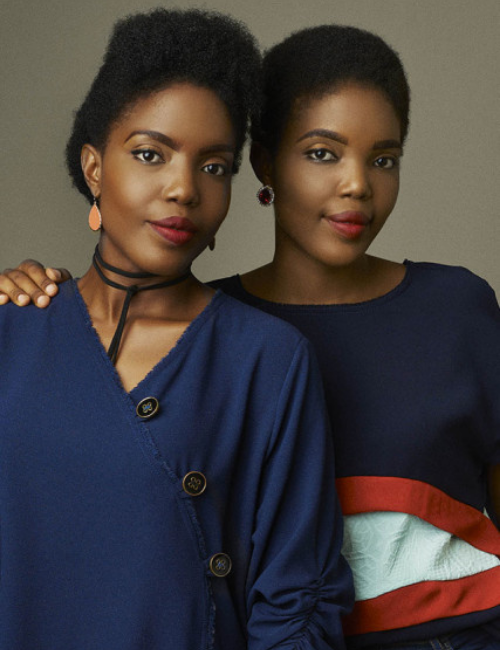How Gozel Green Is Paving the Way for a New Wave of Luxury Fashion in Nigeria
Twin sisters Sylvia Enekwe-Ojei and Olivia Enekwe-Okoji founded the Nigerian clothing label Gozel Green in 2012. Using bold pops of color and radical silhouettes, the sisters have created a look that embodies contemporary Africa.
In their latest collection titled Writings on the Wall, the twins are at their brightest, literally. These pieces layer heavily saturated blues, greens, and reds together to create a wide array of jaw-dropping looks.
The Igbo word "Kedu" with its shifting meanings plays an especially central role in the Kedu Dress and the Kedu T-Shirt. Not all Gozel Green pieces are so bold. Our select collection includes the more muted Black Puzzle Skirt and the Long Sleeve Gash Dress among others.
The twins disregard conventional fashion and instead, draw on their Igbo roots and the varied south-eastern Nigerian cultures in which they grew up for inspiration. Their goal is for their collection to tell a story. The result is explosive designs that encourage the viewer to think more deeply about the meaning behind the fabric in which we cloak our bodies.

Keep reading for the sisters’ conversation with The Folklore on their inspiration, materials, and latest collection.
The Folklore: Storytelling through clothing is a big creative drive for your brand. What story did you both want to showcase in your latest collection?
Olivia: For us at Gozel Green, storytelling plays a huge part of our identity. We believe that through storytelling, a lot can be learned, re-learned, and imagined.
It's like an engine for creativity. We wanted to share a part of our heritage to the world without being too persuasive. By channeling an indirect learning canvas of words, the collection generates conversation and inward exploration.
This is evident in the choice of color block palettes and the techniques employed to deconstruct rich popular cultural attires worn by ancient and contemporary Igbo people.
The Folklore: What kinds of materials were used to create these designs and why?
Sylvia: Gozel Green has remained committed in its use of intentional materials. When we founded our brand, we wanted to stay original. Our collection reintroduces authenticity and pride in our heritage, hence why we chose to infuse durable and unique materials (adire and polyester crepe) into it.
Adire is a popular Nigerian fabric that's 100% organic, hand dyed by local artisans, sustainable, and ethical. What could be more brilliant that using that to tell our unique story to the world?
We're also so in love with the polyester crepe and how it sits stunningly in our silhouettes. We decided to infuse these two durable fabrics to create a collection you won't find anywhere else.
The Folklore: How does the brand stay sustainable?
Olivia: It's in Gozel Green's DNA to stay green. We're intentional in the decisions we make as a brand and we stick to it. We source and produce most of our materials in Nigeria, and we make sure that our scraps of fabrics that many deem a "menace" or "waste" are artistically deconstructed and infused into other designs.
For instance, our best-selling gash dresses were made using up to 60% of our recycled materials. These recycled pieces have stood the test of time and further reassure us of the need of up-cycling to minimize waste and hazard. We also make sure that our working standards are ethical and socially responsible.
Again, Gozel Green’s objective has always been to sustain and promote the African narrative. This is found in our integration of our late father’s works that are rich in our African culture and heritage in most of our collections.
We believe that the Igbo people have significant roles to play in our society. Our stories must be told and heard in any form necessary.

The Folklore: The incorporation of the Igbo words in your designs are striking. Why was this done and what did it mean for the two of you?
Sylvia: We introduced an experimental concept of Igbo words and letters. We wanted the wearer to visualize and generate — whether directly or indirectly — inward exploration of these words.
"Kedu" is a popular word in Igbo that's relative and can represent different words and meanings in sentences. Words such as where, when, how, which, what can be originated depending on the context of the sentence being used.
The Folklore: What are some of the challenges and advantages of working in the Nigerian fashion industry?
Sylvia: The Nigerian fashion industry is becoming a force to be reckoned with, courtesy of the rising creatives and budding talent across the country. At the same time, challenges are synonymous to success stories.
As a brand that not only sources and produces in Nigeria, but adapts to the declining economy, our challenges stretch to a level where only our passion and drive keep our momentum and energy in motion.
From not having electricity to dealing with poor security, and more, these are some of the challenges we face every day, but they have made us more resilient. We constantly find ways to ensure a successful business by saving energy and materials that are important for our productions.
Additionally, Nigerians are commonly seen as creative, witty, loud, social, and upbeat. These are, in fact, true and accurate, so these attributes make onlookers perceive the challenges that come our way as "okay" and "easy" to handle.
On the flip side, perhaps, this perception is an added advantage of working as a creative in the Nigerian fashion industry. There’s a lot of networking and socializing that make things work even faster for the creative.
Often a mere "meet-and-greet" can change one’s narrative as a whole, but one thing we've learned is that one’s passion and talent may or may not always put them on the top. What actually puts a business above the rest is hard work and drive.



